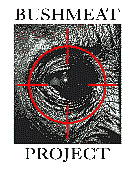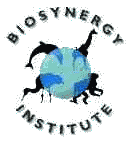 | contact: |
CITES Bushmeat Working Group MeetsThe first meeting of the CITES Bushmeat Working Group was held in Douala, Cameroon from 24th to 26th January 2001, having been formally opened by H.E. Sylvestre Naah Ondoua, Minister for the Environment and Forestry.The meeting had been called by the Secretariat of the Convention on International Trade in Endangered Species of Wild Fauna and Flora (CITES) following a decision taken at the 11th meeting of the Conference of its Parties, held in April 2000 at UNEP headquarters in Kenya. At that event, the international community agreed that there was clear evidence that trade in bushmeat was being conducted, in some areas, in an unsustainable fashion and in contravention of national and international laws. The Conference was particularly concerned about the trade's impact upon highly endangered animals, such as elephants and the great apes, whilst recognizing that a wide variety of other animals were also being affected. At the Conference, Parties from the Central Africa sub-region volunteered to examine the issues involved with the aim of identifying solutions. Distinguished delegates from Cameroon, Equatorial Guinea, the Republic of the Congo and Gabon were present. Delegates from the other member countries of the Group, the Central Africa Republic and the Democratic Republic of the Congo, were unable to attend. Chad attended as an observer. They were joined by representatives from international and national non-governmental organizations. The CITES Secretariat, the International Tropical Timber Organization, the United Kingdom of Great Britain and Northern Ireland and the United States of America were also represented. The participants heard reports from the Central African countries in regard to their efforts to date in researching the use of bushmeat and addressing the various issues relating to its trade. The meeting acknowledged that the use of bushmeat for subsistence purposes could take place in a sustainable manner but that the increasing commercialisation of the trade was having serious impacts upon a range of species. Delegates complimented the four countries on their detailed work in preparation for the meeting. Non-governmental organizations made presentations relating to their projects being conducted in parts of Central Africa investigating, monitoring and tackling some of the issues. The Working Group welcomed the efforts made by such organizations, particularly where these involved local communities and partnership with government agencies. During the course of its discussions, the Group identified the following as factors contributing to the negative aspects of trade in bushmeat: socio-economic issues; political instability; legislation inadequacies; lack of information and education; unformed governmental policy; inappropriate natural resources management; adverse impacts of technology; commercialisation of the trade; and shortcomings in institutional capabilities. Participants agreed that some issues, such as poverty, were outside the control or normal capabilities of wildlife departments and would require such long-term effort and very substantial financial commitment that it was impractical to focus on these issues at this time, although it was important that they be identified. Consequently, the Working Group attempted to prioritise the issues and discussed possible solutions. The Group moved to establish a working plan for its activities and create action plans to tackle the factors that it thought required priority and which it believed could attract practical responses in the short term. For example, the Working Group agreed that the modernization and harmonization of law in the sub-region deserved close attention. The Group also agreed that its work could produce important examples for other parts of Africa and to all Parties to CITES around the world. The Working Group recognized that a multi-agency and partnership approach would be needed for the responses to be effective. In particular, it saw scope for work with the Convention on Biodiversity and the Food and Agriculture Organization of the United Nations in managing natural resources and maintaining food security. The meeting agreed to investigate potential sources of technical and financial assistance and called upon relevant international and national governmental and non-governmental organizations to support the CITES Bushmeat Working Group. A detailed report of the first meeting, its outcomes and recommendations, will be submitted to the next meeting of the CITES Standing Committee in Paris, France, in June 2001. The financial support of the United Kingdom of Great Britain and Northern Ireland and the United States of America was acknowledged as having enabled the meeting to take place. As the meeting closed, participants offered their sincere thanks to the Government and officials of Cameroon for their hospitality and work that had led to a very successful meeting. The Working Group agreed to meet again later in 2001. The Bushmeat Working Group includes national representatives from Cameroon, Central African Republic, Democratic Republic of Congo, Republic of Congo (Brazzaville), Equatorial Guinea, and Gabon. These countries will serve as the case study area for identifying the scope of work and possible solutions. Results of their activities will be disseminated to other countries where illegal bushmeat commerce endangers species survival: Benin, Côte d'Ivoire, Ghana, Republic of Guinea (Conakry), Kenya, Liberia, Mali, Niger, Sierra Leone, Togo, Zambia. |
THE BIOSYNERGY INSTITUTE
P.O. Box 488
Hermosa Beach, California 90254
USAhttp://biosynergy.org/bushmeat/
